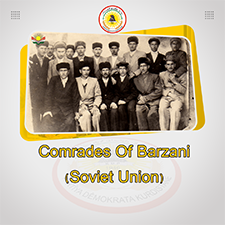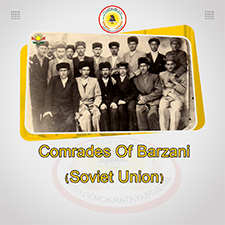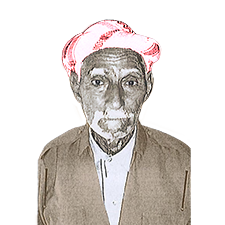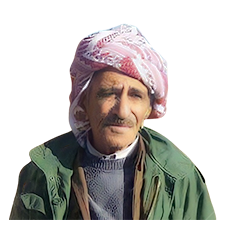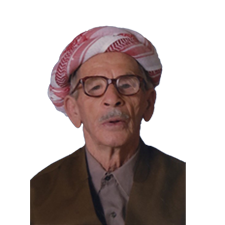Biography
He was born in 1918 in Babseva village, Barzan sub-district, Mergasur district, Erbil province. Before going to the Soviet Union, he was married to Parin Isa Goran. They had a son named Mustafa Saleem born in 1944, who went missing on July 31, 1983, during the Barzani Anfal operation (an ethnic cleansing campaign started by the Ba’ath regime against the Kurds in Iraq) by the Iraqi government in the Qushtapa community.
Saleem Rashid studied in the Soviet Union and received a bachelor's degree in agriculture. He married Zahra in the Soviet Union. After returning to Iraq in 1959, he was employed as an employee in the Sulaimani Agricultural Office and later transferred to the Barzan Agricultural Office.
In 1980, he was transferred to the Qushtapa community, then he was re-employed as an employee in Erbil Agriculture Office. He was fluent in Kurdish, Arabic, and Russian. He died on October 28, 2006.
Service Record
In 1943, he joined the ranks of the Second Barzan Revolution and participated in the conquering of the following police stations; Sinjar, Bedarun, Kani Rash, and Ble; Shanadar police station on October 2, 1943; Kherzok police station on October 12, 1943; Mazne police station on November 10, 1943; Mergasuri police station on August 8, 1945. On August 19, 1945, all his mobile and non-mobile property was confiscated by order of the Iraqi Military Customary Court.
He moved to East Kurdistan on 11 October 1945 after the failure of the Second Barzan Revolution. On 31 March 1946, he joined the Barzani Forces of the Kurdistan Democratic Republic Army in Mahabad. On April 29, 1946, he participated in the Battle of Qarawa in the Saqiz region of East Kurdistan and lost his hands in the battle.
After the failure of the Kurdistan Democratic Republic on 19 March 1947, he participated in the battles of Naghdeh and Shino. He was one of the Peshmergas who returned to Sherwan and Mazuri on 19/4/1947 via Khawkurk and Dashti Barazgar in North Kurdistan.
After, their return, General Mustafa Barzani held a meeting with his comrades in the village of Argosh on 15 May 1947. He gave his comrades a free choice whether they want to stay or go to the Soviet Union. All his comrades decided to continue and leave for the Soviet Union. On May 23, 1947, Salam accompanied General Mustafa Barzani to the Soviet Union and participated in the Battle of Qtur People and the Battle of Mako Bridge. On June 18, 1947, after plenty of difficulty, he crossed the Aras River on the border between Iran and the Soviet Union.
After arriving in the Soviet Union, on June 19, 1947, he and all his comrades were detained in Nakhchivan, Azerbaijan, for forty days in an open community surrounded by barbed wire and guarded by soldiers. In terms of food, clothing, and transportation, they had been treated as prisoners of war. They were later divided into the regions of Aghdam, Lachin, Ayulakh, and Kalbajar in the Republic of Azerbaijan on the decision of the Soviet government. On December 10, 1947, they were transferred to a military base on the Caspian Sea in Baku, the capital of the Republic of Azerbaijan. On the 23rd of the same month, they were given military uniforms and received eight hours of daily military training under the supervision of officers of the Republic of Azerbaijan. At the same time, they were taught Kurdish for four hours a day by some of their educated comrades.
After Jafar Bakirov's mistreatment of his comrades, Barzani decided to move his military camp from Azerbaijan on August 29, 1948, to the community of Chirchuk near Tashkent, the capital of Uzbekistan, where they continued their military training.
In March 1949, he and his comrades were distributed by train to the villages of the Soviet Union and worked on the farms of the “Kolkhozes” (land that people rented from the government and then gave a share of the product to the government).
After much effort and sending several letters by General Barzani to Stalin, Stalin finally received a letter in which Barzani talked about the suffering of his comrades. He immediately decided to form a committee to investigate the situation of Barzani's comrades. The committee finally decided to gather them all in Vrevsky, so in November 1951, General Barzani and his comrades went to Vrevsky, Soviet Union.
After the July 14, 1958 revolution in Iraq and the return of General Mustafa Barzani, on February 25, 1959, according to both Articles 3 and 7, paragraph (a) of Article 10 and according to Article (11), and based on the amended law No. 19, General Mustafa Barzani and his comrades were granted a general amnesty.
In 1958, the Iraqi Republic was established under the leadership of Abdul Karim Qasim. on April 16, 1959, President Barzani returned to Kurdistan with his comrades on the Groza ship through the port of Basra in southern Iraq.
In 1961, he participated in the September Revolution. He participated in the battles of Ma'id, Nahle, Mullah, Shindr, Sar-e-Pirs, and Daret Karaja between Ble and Rezan areas. In 1975, after the failure of the September Revolution, he was transferred to southern Iraq by the Iraqi government and settled in Shafa'a, Diwaniya province.
Sources:
-
حهمید گهردی، پوختهی مێژوونامه، چاپی یهكهم، (ههولێر - دهزگای چاپ و بڵاوكردنهوهی ئاراس - چاپخانهی وهزارهتی پهروهرده - 2004ز).
-
حیدر فاروق السامرائي، ضیاء جعفر ودوره السیاسي و الاقتصادي في العراق، (لندن – دارالحكمة - 2016م).
-
شهعبان عهلی شهعبان، ههندێك زانیاری سیاسی و مێژوویی، چاپی سێیهم، (ههولێر - چاپخانهی ڕۆژههڵات - 2013ز).
-
صالح یوسف صوفي، كرۆنۆلۆژیا كوردستانێ و جیهانێ، چاپا ئێكێ، بهرگێ دووێ، (دهۆك - چاپخانا پارێزگهها دهۆكێ - 2013ز).
-
عمر فاروقی، سردار دانا زندگی و مبارزات مرحوم ملا مصطفی بارزانی، چاپ دوم، (ههولێر - چاپخانهی وزارت آموزش و پرورش - 2002ز).
-
عهبدولڕهحمان مهلا حهبیب ئهبوبهكر، عهشیرهتی بارزان له نێوان 1931 - 1991، چاپی یهكهم، (ههولێر - چاپخانهی وهزارهتی رۆشنبیری - 2001ز).
-
كاروان محهمهد مهجید، بارزانییهكان له مههابادهوه بۆ سۆڤێت، چاپی یهكهم، (سلێمانی - چاپخانهی پهیوهند - 2011ز).
-
گۆڤاری ههتاو، ژماره 154، ساڵی شهشهم، ههولێر، چاپخانهی كوردستان، ههینی، 15 نیسانی 1959.
-
له یادداشتی فهرماندهی شههید حهسۆ میرخان ژاژۆكی، 62 رۆژ لهگهڵ بارزانی دا چوونی بارزانییهكان بۆ یهكێتی سۆڤێت، چاپی یهكهم (ههولێر - چاپخانهی رۆشنبیری - 1997ز).
-
مسعود بارزانی، بارزانی و بزوتنهوهی رزگاریخوازی كورد 1931 - 1958، (دهۆك - چاپخانهی خهبات - 1998ز).
-
نهجهف قولی پسیان، له مهابادی خوێناوییهوه ههتا لێوارهكانی ئاراس، و. شهوكهت شێخ یهزدین، چاپی یهكهم، (پیرمام - یۆبیلی زێڕینی پارتی دیموكراتی كوردستان - 1996ز).
-
ئـ.د.ئـ، فایلی ژماره AI-10، لیستی ههڤاڵانی مستهفا بارزانی بۆ یهكێتی سۆڤێت، بهڵگهنامه لهلایهن سهگڤان هاڵۆ پێشكهش كراوه، 2016ز.
-
ئـ.د.ئـ، فایلی ژماره HB-158، پارتی دیموكراتی كوردستان، بارهگای بارزانی، لێژنهی باڵای ناوچهی بارزان، فۆرمی سهلیم ڕهشید سهلام ڕهشید، پیرمام، 1 تشرینی دووهمی 2018ز.
-
ئـ.د.ئـ، فایلی ژماره ZB-191، دهقی چاوپێكهوتن لهگهڵ باقی مستهفا سهلیم لهلایهن سامی عهبدی، پیرمام، 22 كانوونی دووهمی 2020ز.




